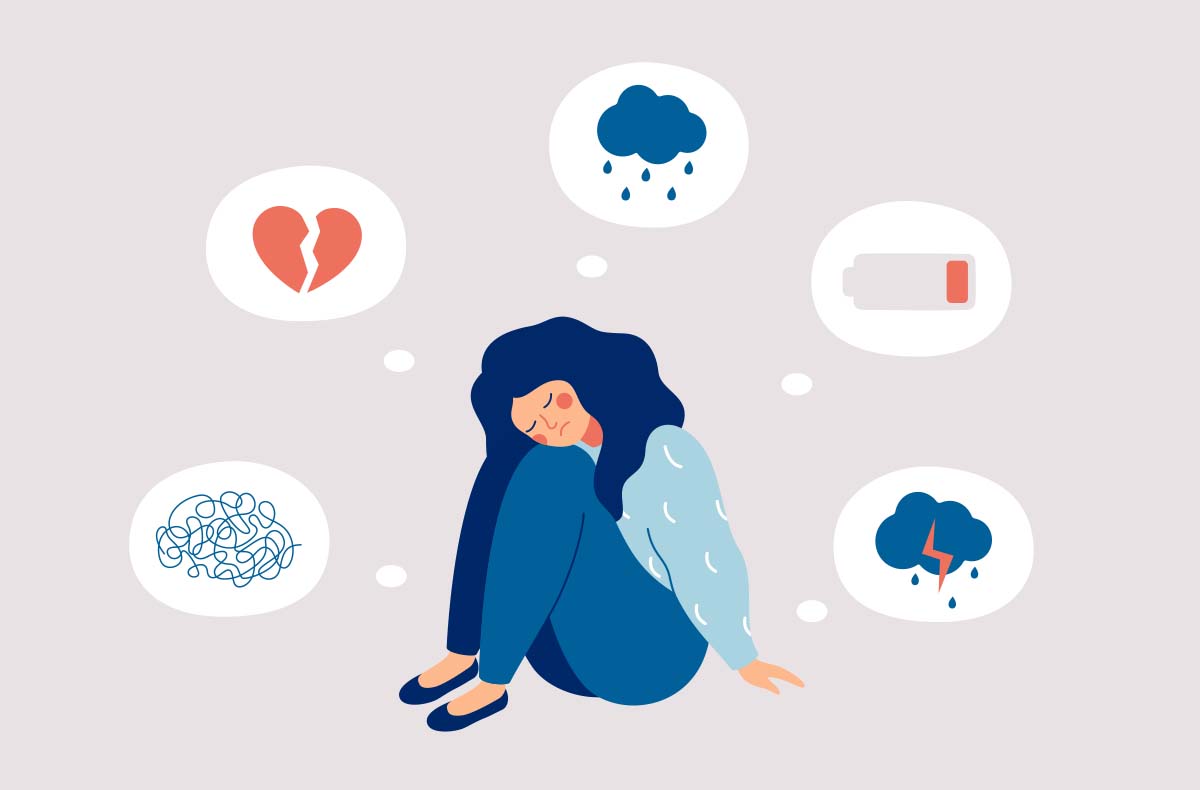
The global mental health market was valued at $383.31 billion in 2020 and is expected to reach $537.97 billion by 2030. The growth of this market is exciting to see, but at the same time, is it really solving the ever-growing problem of suffering individuals that lies behind it? All I see is more of the same, but tied up in slightly different packaging.
When I first started struggling with my mental health as an angsty teenager, I felt alone, confused and unprepared for what was coming my way. Thoughts swirled around in my head: Why is no one else struggling with the basics like I am? Why can’t I get out of this rut? I don’t understand what is going on!
My biggest problems:
I had zero self-awareness about my own mental health.
I had no one else around who was talking about the subject to offer me guidance.
These fundamental issues still exist today. Many people don’t have suitable proficiency to note their own symptoms of mental health issues, let alone the self-awareness to then reach out for support. Furthermore, when it comes to bridging the conversation of mental health, people lead by example: if there’s a conversation to join, people will join it in time.
However, if there’s no pre-existing dialogue, people tend to say nothing at all for fear of saying the wrong thing. As someone who’s definitely been at the receiving end of “I didn’t know what to say so I said nothing”—please don’t treat people who are struggling with their mental health like they’ve got a contagious disease. You don’t need to provide solutions or answers, all you need to do is show up and listen.
Whilst we’ve definitely made progress and started a huge conversation around mental health that never existed before, there’s a lot more conversations that need to be had. The stats across the globe are concerning. A recent WHO scientific brief suggests that in the first year of the COVID-19 pandemic, global prevalence of anxiety and depression increased by 25%. This figure is even higher for women and young people. In the UK, Covid has sparked a dramatic increase in the number of people experiencing mental health problems, with 1.6 million waiting for specialised treatment and another 8 million who cannot get on the waiting list, but would benefit from support. This number is only going to increase. It’s clear that, for many of us, the option of professional help is not going to be accessible or possible right now, so we need a plan B—something that has been wildly overlooked.
In a world where we have so much at our fingertips, we can all play a small part in solving our global mental health crisis, whether that be by educating ourselves privately or starting a conversation on the subject that might just give someone the confidence to ask for help when they most need it. The more self-aware I have become of my own mental health, the better equipped I have felt to navigate it. Developing this awareness has taken time, but I’ve worked hard at acquiring as much knowledge as I can alongside my own experiences to understand me, myself and my mental health better. I read, I listen, I share my story online, I speak to friends, I open up to colleagues, I reach out for help from professionals. I’m mental health literate: and if more of us are too, a domino effect of change is possible.
With my own mental health literacy comes the power to support others on their own psychological journeys. The self-awareness I now have of my own mental hygiene has made me empathetic to others and what they are going through, in both a personal and professional capacity. I use my own experience as my compass. Firstly, I am incredibly passionate about ensuring that no one else feels alone in their struggle like I did. I’ve got a lot of experiences and stories that I am very comfortable sharing. Disclosing these helps others realise that they’re not alone in what they’re going through—it’s a path others have travelled before. Secondly, I want to ensure that people can better understand their own mental health by realising its importance by talking about it with others and having ample access to educational resources. I truly believe in the power of conversation. Reaching out is hard, and people might need a helping hand—I know I did. If someone can meet you halfway, that’s incredible. My mission is to be this hand for as many people as possible. A small gesture can go a long way in encouraging self-reflection and personal understanding.
When talking about mental health, it is important that we break down the term so that we are all on the same page. I’ve been asked on multiple occasions, “what even is mental health?” which is pretty telling of the confusion over the term. In a recent MindLabs article, Natasha Devon breaks down mental health into three columns: diagnosable mental illness, wellness, and a third column Natasha denotes as “issues which cause an individual distress, or adversely affects their health, but they wouldn’t automatically seek medical assistance for.” Breaking down the term is imperative because we need to acknowledge that there is a distinction between mental health and mental illness. The spectrum is a lot wider than people recognise. As someone who has been diagnosed with bipolar disorder—a mental health condition that causes extreme mood swings that include emotional highs (mania or hypomania) and lows (depression)—I find it incredibly frustrating when people who are ill-informed about mental illness encourage me to “have a bath” or suggest I cheer up since others “have it worse.”
I like to envisage a future world where everyone has a basic understanding of mental health and mental illness, allowing them to be better in tune with their own mental health whilst more effectively supporting others. Although not always the case, I often have to educate a lot of people I speak to about what bipolar disorder is, and what it means for my day-to-day life. As with a language, when you know the basics, you can string a sentence together. I’m certainly not expecting everyone to be fluent. The same applies for mental illness: I don’t expect you to know all the ins and outs, but a certain general understanding should be expected.
We all have a duty to be as well-versed as we can be about mental health. If you don’t know what anxiety is, read up about it, talk about it, get to the bottom of it. You’ll never recognise it in yourself or be able to support someone else in the best way if you’re unaware of the basics. Without the basics, you can’t hold a meaningful conversation on mental health. Without that, we’re limiting the progress that we can make as a collective. So I encourage you to ask yourself: How mental health literate are you?
Resources to aid your mental health literacy:
Mind
Mental Health America
National Alliance on Mental Illness
National School of Healthcare and Science
Just Say Yes: Resources for Youth Combating Isolation

